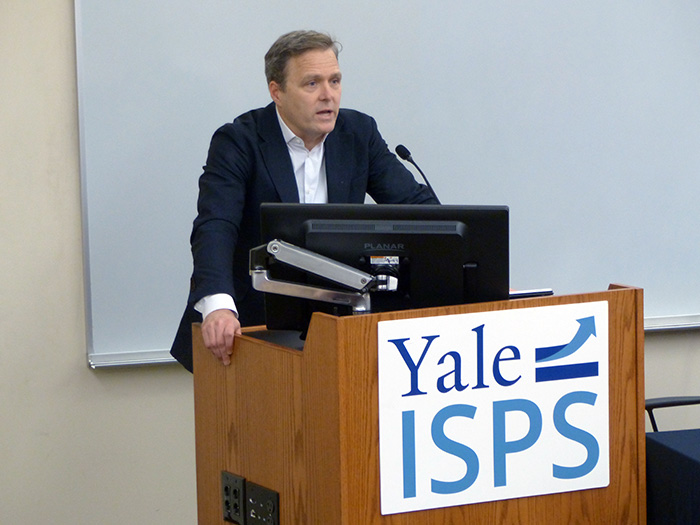Why We Can’t Have Nice Things: Nicholas Bagley on How the Law Is Holding America Back

Nicholas Bagley wants to make America great again, though not necessarily in all the ways that phrase implies.
“The United States once successfully prosecuted two world wars, built the national highway system, created Social Security and Medicare, and diverted enough water to support huge cities in western deserts,” said Bagley, Thomas G. Long Professor of Law at the University of Michigan Law School. “We used to be able to do big things, and now we struggle with the basics.”
At a recent talk at Yale’s Institution for Social and Policy Studies, Bagley previewed an upcoming book, tentatively titled “Why We Can’t Have Nice Things: How the Law Is Holding America Back.” The event was sponsored by ISPS’s Democratic Innovations program, tasked with exploring how improving institutions can make government more effective in solving important social problems.
Bagley argued that extensive, time-consuming procedural reviews have stymied the construction of housing, leading to exorbitant prices and surging homelessness that stunt economic growth; allowed public infrastructure to deteriorate and fall behind peer countries due to high building costs; and delayed renewable energy advancements within a tangle of extensive, required environmental studies and punishing litigation, often brought by environmental groups themselves despite the growing dangers of global climate change.
“The law has contributed to American sclerosis that is becoming, I think, increasingly hard to ignore,” he said. “The recent victory of former President Trump in the election was about many things. But one of those things was a sense that nothing works. Everyone is too slow, too bureaucratic, too burdened with red tape. Government is failing the public.”
Bagley discussed a U.S. Supreme Court case decided in June, in which five justices prevented the Environmental Protection Agency from enforcing its “Good Neighbor” rule requiring 23 states to reduce air pollution affecting downwind states. Analysts projected the rule would have prevented 1,300 premature deaths in 2026 alone, Bagley said. But the court blocked the rule because the EPA allegedly failed to respond adequately to a single comment from a group representing manufacturers and oil companies.
“The rule was enjoined, the upwind states could continue being bad neighbors, and public health has already suffered,” Bagley said. “What’s surprising about this whole episode is just that it is not very surprising at all.”
Bagley said that courts have long agreed that agencies are supposed to respond to all the comments they receive and that a rule should be invalidated if the agency fails to offer a sufficiently thoughtful response.
He traced this highly legalistic approach to the public’s lost faith in government around 1970, backlash to the Vietnam War, and the rise in movements around civil rights and protecting the environment. Courts began to intensify their review regarding reasonableness, a legal concept guiding their examination of constitutionality or lawfulness of legislation and regulations. In addition, they began to enforce strict adherence to public notice and comment rules, broadened standing requirements for challengers, and adopted a strong presumption of their authority to review such matters.
“The goal was to make sure that the public’s voice broke through the political logjam,” Bagley said. “That agencies would be responsive to the public’s interests and concerns and not to the bureaucrats who were so locked into their mission that they were heedless of the costs of their action.”
During this time, the country’s legal culture shifted, Bagley explained. New public interest organizations appeared. Congress passed new laws, such as the Freedom of Information Act of 1967, the National Environmental Policy Act of 1969, the Federal Advisory Committee Act of 1972, the Privacy Act of 1974 and more.
“Courts took those laws, and they put them on steroids,” he said.
Notably, both Democrats and Republicans embraced this new brand of legalism, Bagley said. Strict procedural rules backed up by court review — with the federal judiciary dominated at the time by Democrats — appeared well suited for progressive reforms. And Republicans saw an opportunity for business interests to push back on agencies that overextended their reach, he said.
Skipping ahead in time, Bagley illustrated how procedural wrangling and litigation have stalled a project to build a protective tunnel for a pipeline in Michigan that was struck by a ship’s anchor in 2018.
Despite bipartisan agreement on the need to address the risks and the oil company’s willingness to finance the tunnel, the project remains delayed. The U.S. Army Corps of Engineers received 17,000 public comments on an initial review and will not even release its environmental impact statement until at least 2026, Bagley said. At which point, the project will surely face new lawsuits from environmentalists and native tribes.
“We do in fact know how to build tunnels,” Bagley said. “It is five miles. It is not that hard. And yet the oil continues to flow, and that is pretty much how everything in America goes these days. Even the most modest ambitions get mired in endless controversy.”
To reduce procedural burdens, Bagley proposed undoing the presumption of reviewability and limiting court review to questions of legality, transforming the notice and comment process, requiring timelier lawsuit filing, and restricting the scope of people with sufficient standing to file lawsuits.
ISPS Director Alan Gerber, Sterling Professor of Political Science, moderated a panel to discuss Bagley’s proposals.
Amy Kapczynski, professor at Yale Law School and faculty director of the Law and Political Economy Project and Global Health Justice Partnership, questioned whether Bagley is targeting proceduralism in general or the issue as it affects specific areas, such as land use.
In addition, she pointed out that Bagley’s account focuses on simply dialing down procedural barriers, but not replacing them with another model of accountability — relying instead simply on the good will of experts or electoral accountability. Her own work, she described, focused instead on models of accountability organized around building countervailing power among groups marginalized in our democracy, such as unions of workers or tenants.
David N. Schleicher, Walter E. Meyer Professor of Property and Urban Law at Yale Law School, suggested that legalism might be a tool, rather than the central issue, which he identified as an entrenched ideology against growth and change that emerged in the 1960s and 70s. He proposed creating procedural rules that support growth and development, rather than simply removing existing ones.
Stephen Skowronek, Pelatiah Perit Professor of Political Science and ISPS faculty fellow, presented a historical perspective contrasting the three-branch accommodation to administrative power in the 1940s with the three-branch turn against administrative power in the 1970s. He argued that the democratization of the Constitution in the 1970s created deep uncertainty and a scramble for security among various interests, leading to a pervasive distrust of administrative discretion and the growing difficulty in substantive problem solving.
“It was a great pleasure to host Nick for this engrossing and constructive conversation,” Gerber said. “One of our missions at ISPS is to investigate and fine-tune innovative approaches to calcified problems in our society. Nick’s scholarship and approach demand attention from anyone seeking how to best deploy the immense problem-solving capacities of the country.”
Bagley acknowledged the complexity involved in addressing both the procedural hurdles and broader cultural attitudes towards governance.
“The threats we face this century are profound,” Bagley said. “They include climate change, housing shortages, surging China, and the advent of artificial general intelligence. We need effective government to meet those challenges, and we do not have it.”
He said that radical reforms were necessary and should include the ability to take effective action while protecting vulnerable communities. He admitted they would be a tough sell in the current political environment.
“Everyone wants to use procedural rules to hedge against the threat of the other side,” he said. “But I don’t think we can afford to keep ignoring how we kneecap the government. It’s bad for business. It’s bad for government. It’s bad for Americans’ pocketbooks. And we can do better.”